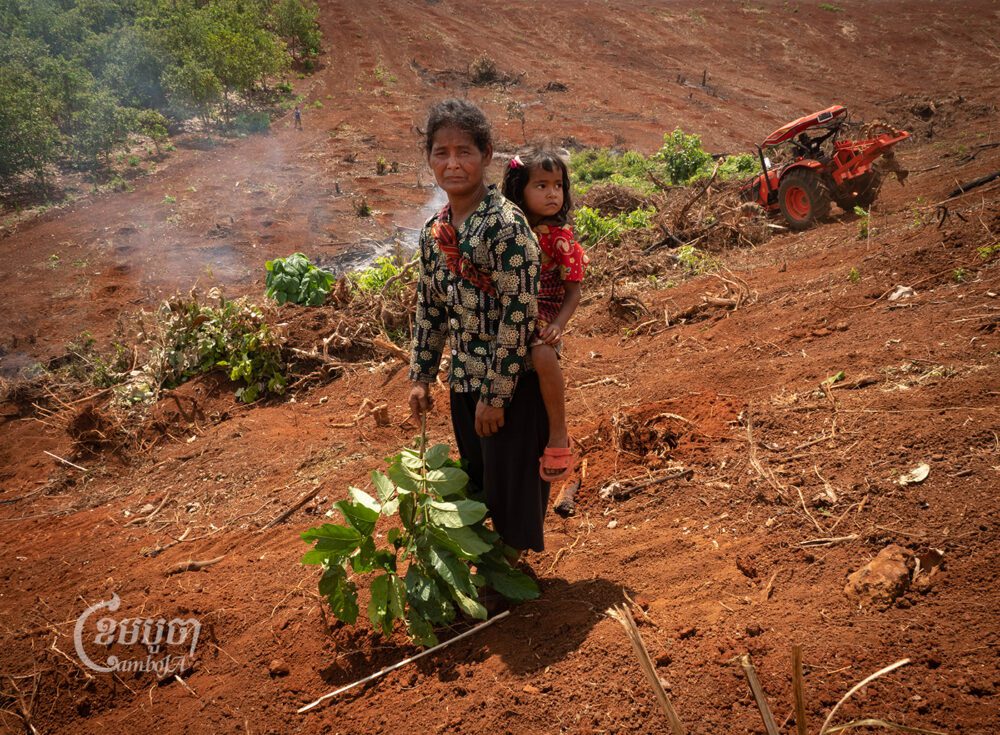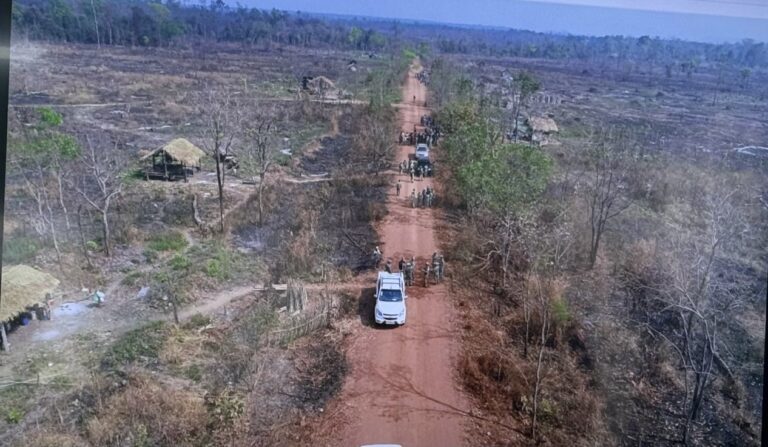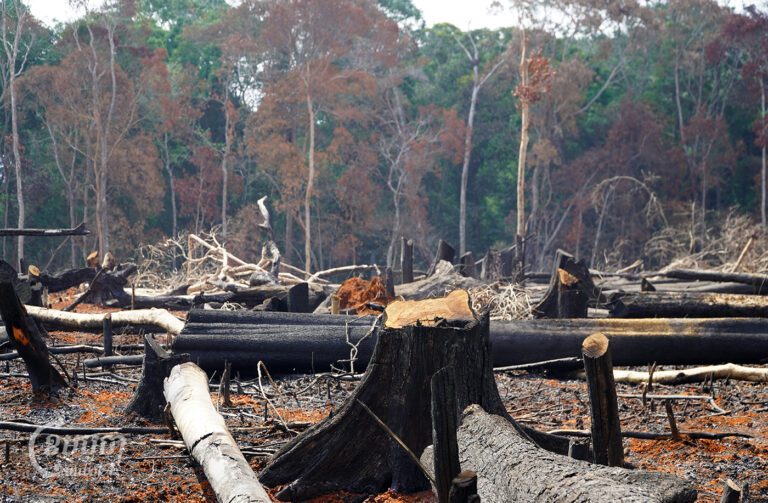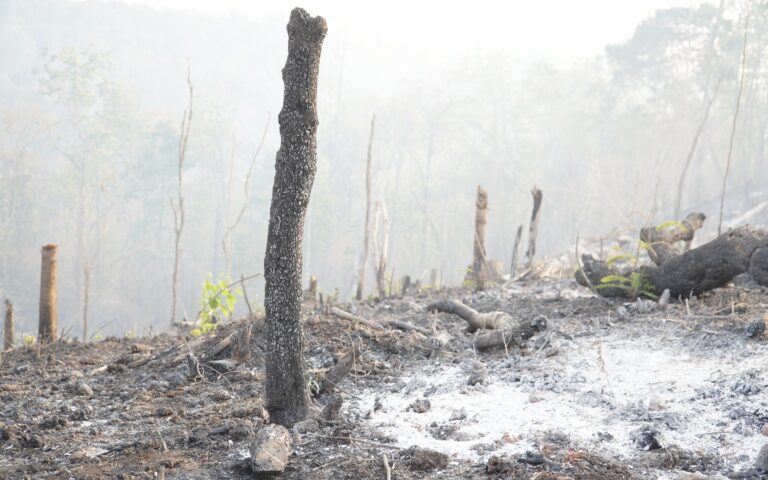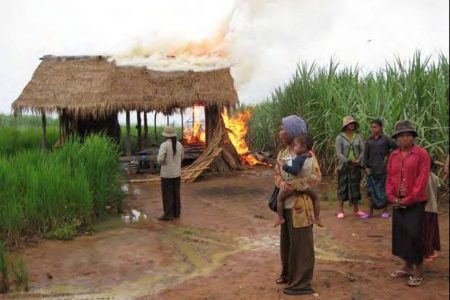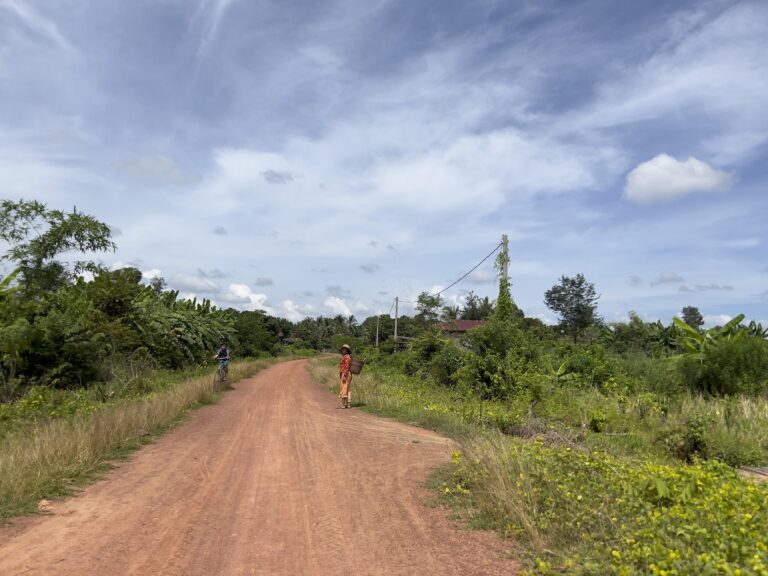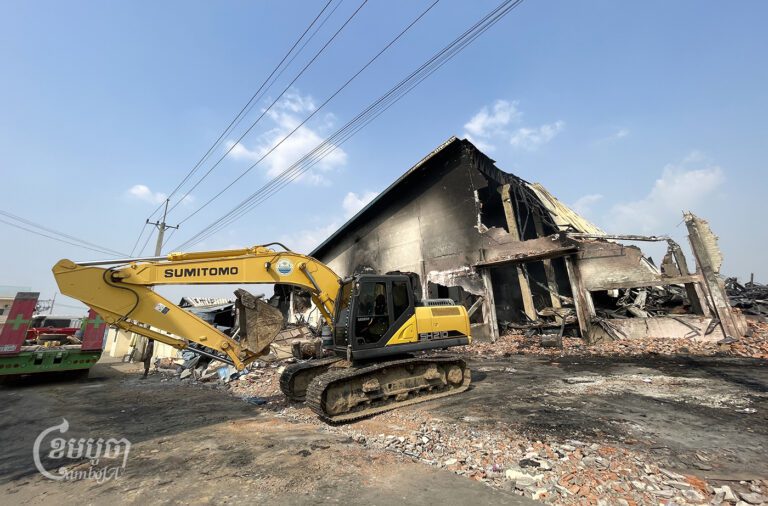The tractors tore into the red earth, ripping apart Heng Hea’s cashew farm.
Hea and her four-year-old daughter watched as the machines, working on behalf of a rubber company controlled by the daughter of one of Cambodia’s former top generals, destroyed their livelihood.
The company had already ravaged the farms of their indigenous Jarai neighbors in Ratanakiri province’s Andong Meas district over the past months. Now it came for the two hectare farm Hea and her Jarai husband had cultivated for years.
“I was working hard on this land and my trees were about to yield fruits, but they ruined everything — that’s ruthless,” said Hea, who is Khmer. “I just want my land back but all of it belongs to them now. How can we live without our land?”
Most of Hea’s cashew trees had already been plowed over. In their place, the tractors had dug out half-meter deep holes to plant neat rows of company rubber seedlings.
As the engines revved behind her, Hea ran into the field and began to fill in the holes for the rubber seedlings with her bare hands, cursing the company, 7 Makara Phary. The firm had expanded rubber planting inside its state-granted economic land concession (ELC), consuming more and more of the communities’ overlapping customary lands in the past six months.

Hea and more than 10 other residents of Tang Chea village, a primarily indigenous Jarai community, told CamboJA they have faced threats and intimidation from gun-wielding 7 Makara Phary workers.
The commune chief said he signed off on upwards of one hundred land sales from villagers to the company in the past year. Community members who agreed under heavy pressure to give up their land claims say they were compensated at significantly less than their worth. They recalled being told their lands would be seized regardless of their consent.
Since December, at least six villagers have had their lands cleared against their will and without any contract being signed, according to an unofficial list kept by assistant village chief Klann Vong, but other villagers said the number was likely much higher. Local media reported that nine families lost their farms to the company in June last year.
Jarai community leaders in Andong Meas say the forced land clearances, loss of livelihood and pressured land sales are the latest in years of abuses they have suffered from the company without recourse or accountability.
Appeals to sub-national authorities have yielded no meaningful results, villagers say. A handful of Tang Chea residents remain camped out guarding their chamkars, or farms, enduring taunts by company workers flashing guns and warning that their land is next to be cleared.
“People do not dare to speak out about these issues because they are afraid that some [authorities] might have compromised their principles,” said Andong Meas Jarai community leader Klann Din. “I wish it would end soon.”
Indigenous communities have struggled to secure legal rights to land they have occupied for generations, while at least 250 ELCs have been collectively awarded over one million hectares of land since 1995, giving them legal right to seize and develop areas often already in use by local communities. Although the government declared a moratorium on ELCs in 2012, new ELCs have been granted since then and existing concessions continue to cause conflict in communities.
Vong — who like many Tang Chea residents shares the surname Klann even though they are not within the same family — said that community members had customarily practiced rotational swidden agriculture in the areas now claimed by 7 Makara Phary.
“People did not know whether that land belonged to the company or not,” Vong said. “They expand their farmlands by clearing land and felling trees to make way for farming.”

A Sanctioned Company Behind the Destruction
In 2006, the government first awarded a 70 year ELC in Ratanakiri’s Andong Meas district, leasing 8,654 hectares overlapping with Jarai traditional lands to a company named Heng Development.
The government later appeared to transfer this same concession to a company named 7 Makara Phary, which received a 8,655 hectare ELC in Andong Meas district in 2011 and had its ELC lease downgraded from 70 to 50 years. The open source data platform Open Development Cambodia references 7 Makara Phary’s ELC as previously belonging to Heng Development.
7 Makara Phary lists Kim Sophary as its Chairman of the Board of Directors in public records. Sophary is the daughter of Kun Kim, a retired senior four star general and former Royal Cambodian Armed Forces chief of staff. Kim has been accused of numerous human rights violations and was placed under sanction by the U.S. government in 2019 for his alleged role in using soldiers under his command to “intimidate, demolish, and clear-out land” for Chinese state-owned firms operating in Cambodia, according to a U.S. Treasury Department statement.
“Cambodian elites like Kim use their familial networks to create shadow structures to shield ill-gotten assets,” the U.S. Treasury Department’s statement said, claiming Kim was “complicit” in state corruption.
Sophary and Kim’s wife and son were also placed under sanctions “for acting or purporting to act for or on behalf of, directly or indirectly, Kim” as well as 7 Makara Phary and four other companies “owned or controlled” by Kim’s family.
Heng Development and 7 Makara Sophary are also connected through family ties. The son of Heng Development’s publicly registered chairperson Seang Chanheng, who holds the honorific title of oknha, married Kim’s daughter in 2010, the year before the government transferred Heng Development’s ELC to 7 Makara Phary.
7 Makara Phary did not respond to CamboJA’s emailed requests for comment and no phone number was found in public records. A woman answering a phone number for Heng Development listed in commerce records claimed she had no affiliation with the company.
Kim, who since 2019 has served as the vice president of the National Committee for Disaster Management, did not answer phone calls requesting comment. Sophary could not be reached for comment.

Seizing Land Without Consent
When CamboJA reporters visited the area in mid-May, the company’s advancing rubber trees gathered force atop a ridgeline overlooking the cashew and cassava farms of the Jarai farmers.
In the land sloping downwards to the rubber plantation, multiple company tractors had trampled at least four villagers’ adjacent cashew farms since March, leaving only the tread of tires over the broken stems of saplings. On May 10, CamboJA saw several tractors continuing to clear land.

“It happened all at once, so quickly,” said 26-year-old Lol Sav, a father who had been farming two hectares of cashew. “I did not know they [the tractors] came, when I arrived at my chamkar it was all gone. I feel so pained, they cleared all my land, how can I feed my family?”
Videos shared with CamboJA, which community members said they recorded in March, show tractors plowing into cashew and banana trees and excavators digging nearby.
In one video, several villagers confront a company worker and ask why the company cleared land without telling them, as multiple tractors traverse contested land in the background. The worker replies: “It does not matter how many years you have planted [farms], we still must clear it.”
Most villagers have been too afraid to visit their farms since they were warned to stay away, but they accompanied CamboJA reporters to view the impacted areas and encountered the company’s workers, leading to a verbal confrontation between around a dozen villagers and five workers.
“Do you have hearts to show that you are Khmer?” one villager shouted at the workers. “All my land has been taken by this company.”

The group of villagers, all of whom had lost land to the company, gathered around, many jabbing fingers at the handful of workers on a hilltop between slopes of cleared farms.
“We cannot solve the problem if people act up like this,” said Lang Sreng, who identified himself as a Khmer foreman working for 7 Makara Phary. “They should ask the authority to register all the affected families and I will suggest the company solve these problems.”
The foreman denied workers had threatened the community and said the company had a legal right to develop the land. Asked by CamboJA about company promises more than a decade ago to help villagers build roads and other supporting infrastructure, Sreng said the company had only recently begun investing in the area.
“Now the company has just started to clear and plant, how can we have money to build [infrastructure]?” he said.
As Hea, the woman whose land the company was clearing that day, shouted at the company’s workers, the foreman smirked, driving his moto away from the angry crowd. “Why so mad, auntie?” he said to Hea. “You can do day labor, just like me.”
From the dirt nearby, villagers dragged up the skeletons of large dead cashew trees, which had required a significant investment of time and capital to reach a size where they could produce profitable fruits.

Tang Chea villager Chom Yorn, 40, said he had around four hectares of cashews farmland which he planted in 2020, all of which were removed by the company in October.
Yorn remains saddled with debt from the money he poured into planting and preparing the land after taking out a microfinance loan from LOLC, leaving him with annual repayment obligations of $1,500 — around the average annual income for most Cambodians — for the next three years.
“It is so difficult for me because the interest rate is high,” Yorn said. “I will need to work for others.”
Nhang commune chief Heam Sam Orn denied there had been intimidation from the company, but admitted the company had not responded to community concerns and committed “errors,” though he did not elaborate.
“The company has an ELC, so whether people want it or not, they [7 Makara Phary] can still clear [the land],” Orn said. “When commune authorities talked with the company they did not listen, so we forwarded the matter to higher authorities [district-level].”
Andong Meas district governor Meas Sareth claimed he was unaware of the issue and had not yet received any letter from the commune, although village and commune officials said a letter was sent to him in December.
Cambodia’s Land Law states that concessions which go unused for more than 12 months are “considered as canceled” and can be reclaimed by the state, but Licadho operations director Am Sam Ath said this is rarely enforced fully.
Im Rachana, spokesperson for the Ministry of Agriculture, Forestry and Fisheries, which oversees ELCs, did not respond to requests for comment.

Pressured Land Sales
Twenty-one-year-old Sav Svate, a newly married Jarai resident of Tang Chea, had been growing corn and pumpkin on around 0.8 hectares of land for the past four years.
In September last year, at Nhang commune hall with the commune chief providing his signature as witness, Svate signed a contract that he could not read, viewed by CamboJA and stating that “as of now, Save Svate has no right to encroach on the company’s land.” The company said it would take over his land in February, yet the farm was plowed over by company tractors in December.
“Whether I agree or not, the company would still clear my land,” Svate recalled the company telling him.
He accepted 800,000 riels, or around $194, in compensation, aligned with the rate of one million riel, or $243.5 per hectare which the company had provided in its more than 100 contracts with farmers, according to Nhang commune chief. The market price of fertile red dirt farmland in the area can fetch prices of up to $1,500 per hectare, Tang Chea villagers say.
Left with no land of his own, Svate said he would try to support his two young children by working as a day laborer cutting grass and harvesting other people’s cashew crops for around $7.5 a day.

None of the four villagers’ whose land was cleared in March said they had signed a contract with the company, nor had Hea or her husband, whose land was being cleared on May 10 when CamboJA visited the area.
Orn, the commune chief, claimed that the commune had not received any benefits from the company but had handled compensation payments to villagers.
“We only act as mediators to end the conflict between people and the company,” Orn said. “It is beyond our boundaries to make deals between the company and affected people, so we put forward the matters to higher authorities.”
Most villagers impacted by the company said they felt the commune chief and other authorities had been unresponsive in helping prevent the loss of their lands or achieve adequate compensation.
At least six villagers have resisted signing deals with the company, according to Vong, the assistant village chief, who has not been involved in the land sales and said the holdouts are coming under heavy pressure to comply with the company’s demands.
One villager who has held on to his land for now, Klann Sean, said he has farmed around four hectares since 2017 and his more than 1,000 cashew trees have finally grown ready to harvest. He visits every few days to check that the farm remains in his possession, repeatedly rejecting demands from regular company representatives who visit his farm and order to sign a contract relinquishing his land for four million riel or $974.
“I do not want any money,” he says. “I only need my land.”

For the past three months, masked company workers armed with guns traveling by motorcycle and a white pick-up truck have sometimes blocked him from entering his farmland.
“Please dig up all your cassava, we are going to clear this land,” Sean recounts being told regularly, as one worker pointed a gun at the sky in warning.
The company workers had appeared since last year, telling him last May to delete photos he took of his farm or face arrest. He refused until two commune police arrived within the hour and demanded he comply. Sean, afraid of arrest or assault, handed over his phone so that the officers could delete the photos.
Company workers have jokingly told him he should go to the neighboring province of Mondulkiri and grab some new land to clear, Sean says.
Believing the company will seize his land eventually, Sean said he is willing to give up his farm in exchange for compensation of 50,000 riel, or about $12.5, for every cashew tree he planted, amounting to more than $12,500 total compensation as compared to the company’s offer of less than $1,000. The company has not accepted his terms.
“Whether you want one million riel per hectare or not, the land will be cleared,” Sean said the workers told him. “You will not be spared.”

No Compensation for Alleged Company Fire
The company also allegedly impacted the livelihoods of 10 Jarai families in neighboring Laom village. In the second week of March, a fire which residents claim was started by the company spread and consumed community farms.

Resident Klan Lit said he was at his own farm nearby working when he witnessed multiple workers felling trees and setting fire to the land in preparation for rubber planting.
“Once fires started, other areas were at risk as the embers blown by the wind caused blazes to spread to new areas,” he said, adding that a large tree on the company’s land had caught fire and collapsed across a drainage ditch, sending the flames into community farms.
But in responding to community complaints, the company has denied that the fire was a natural bushfire and rejected farmers’ demands of compensation for loss of livelihood, said Lit, whose two hectares of grown cashew trees were incinerated.

Seventeen-year-old Klan Krish, who is not within Lit’s immediate family, exclaimed that within an hour he had lost half a hectare of cashew trees which he had planted four years ago and cared for until this year, just as the trees had matured and were finally ready to harvest.
“My cashew trees are entirely gone, so I have to replant,” Christ said. “It affects me a lot, as my expected cashew yield was roughly one million riels ($250). I spent four years waiting to benefit from it, so this is a big loss.”
All it appeared Christ and his neighbors could do now was replant their farms and wait several more years to earn income from them, hoping they would remain safe from the ever-expanding rows of 7 Makara Phary rubber trees.




